Blogs are an indispensable element of the internet. In fact, they’re so crucial in today’s virtual world that we have integrated them into our digitized culture.
Every reputable company or small business probably runs a blog. You can read blogs about fashion, travel, economics, food, books, business, digital marketing…the list could go on forever.
Most internet consumers undoubtedly read at least one blog consistently or are subscribed to one.
Now that we’ve emphasized the prevalence of blogs in our lives, let’s journey back to where it all began.
Interestingly, blogs don’t have a particularly long history. It seems that blogging dates back to 1994, just a few years before social media appeared.
Here we’ll summarize the history of blogging through a timeline of the most important historical events.
The Early History of Blogging
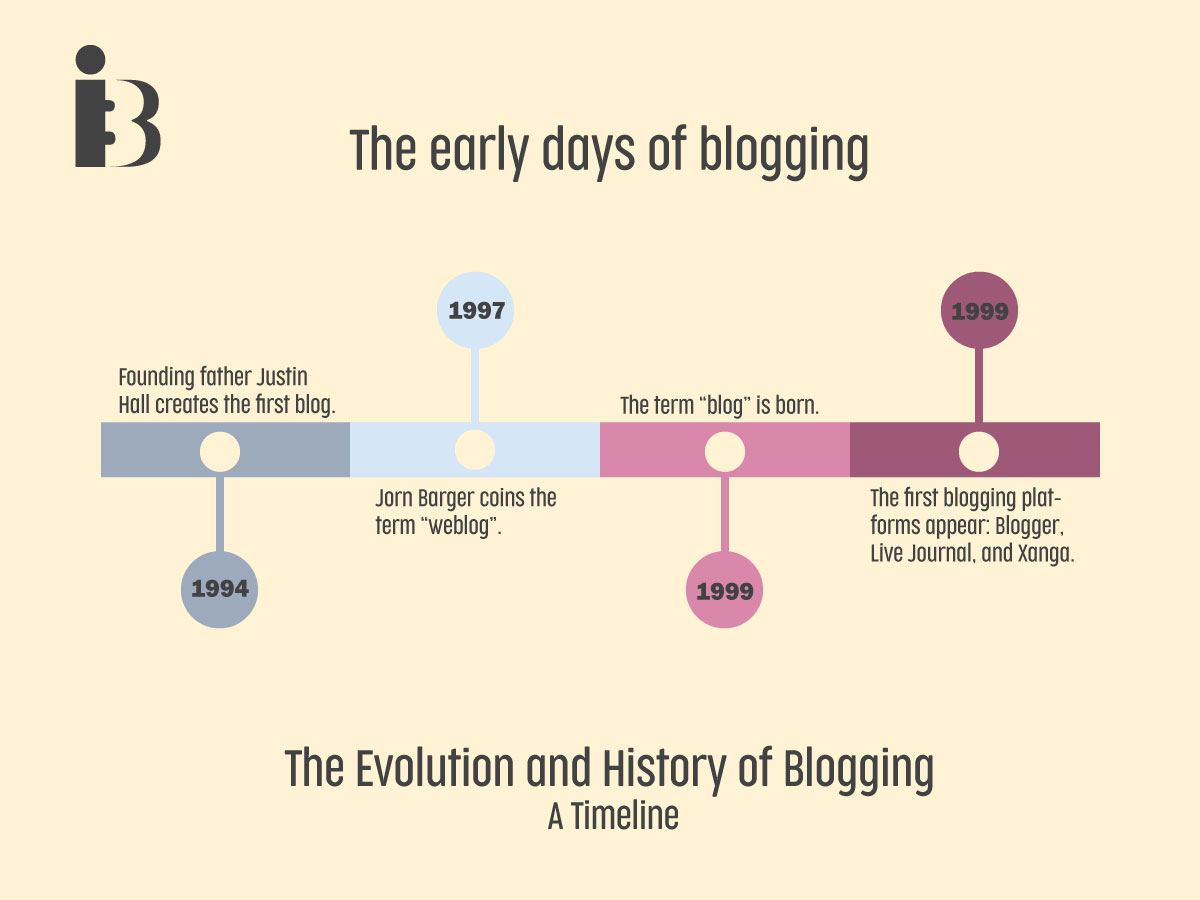
1994: First blog created by Justin Hall on Links.net
There are conflicting opinions regarding the identity of the world’s first blogger. The first evidence of blogging dates back to 1994, when Justin Hall, a college student, created Links.net.
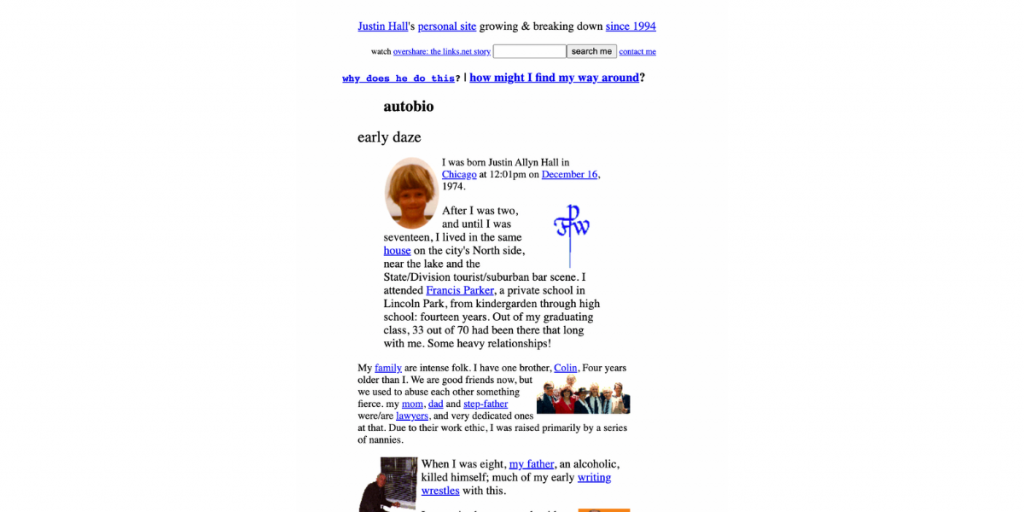
It wasn’t referred to as a blog at the time, but rather as a collection of web pages Justin liked, along with his thoughts on the content the links contained.
Needless to say, it didn’t take long for the trend to catch on, with others quickly following Hall’s initiative.
These pages’ most common names were “personal homepages” or “online diaries.” Since then, blogging has transformed from personal online diaries to powerful tools for sharing information, opinions, and news.
1998: Pioneering Community Blogging: Open Diary
In October 1998, Open Diary revolutionized personal blogging with its community-centric model.
As one of the first blog hosting platforms to adopt a membership approach, it allowed users to not just share but actively engage through comments on others’ work.
This marked a departure from individual-focused blogging, ushering in a new era of communal interaction.
1999: Peter Merholz shortened “weblog” to “blog”
A few years later, in 1997, Jorn Barger invented the term “weblog” to describe this trend which was gaining momentum.
In 1999, the term “weblog” was transformed into the term we all use today, blog, thanks to Peter Merholz.
1999: Blogger was created by Evan Williams and Meg Hourihan
At this point, it was clear that people were genuinely interested in online blogging.
As a result, in 1999, various new blogging platforms were launched, such as Blogger, LiveJournal, and Xanga.
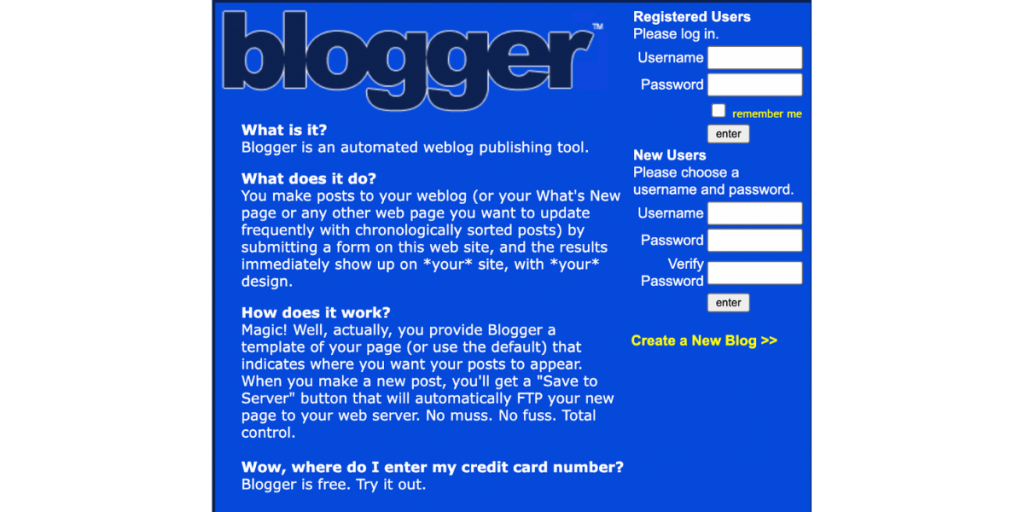
The publishing platform Blogger in particular catapulted the concept of blogging into the mainstream. Due to its huge success, it was subsequently bought by Google in 2003.
The Early 2000s
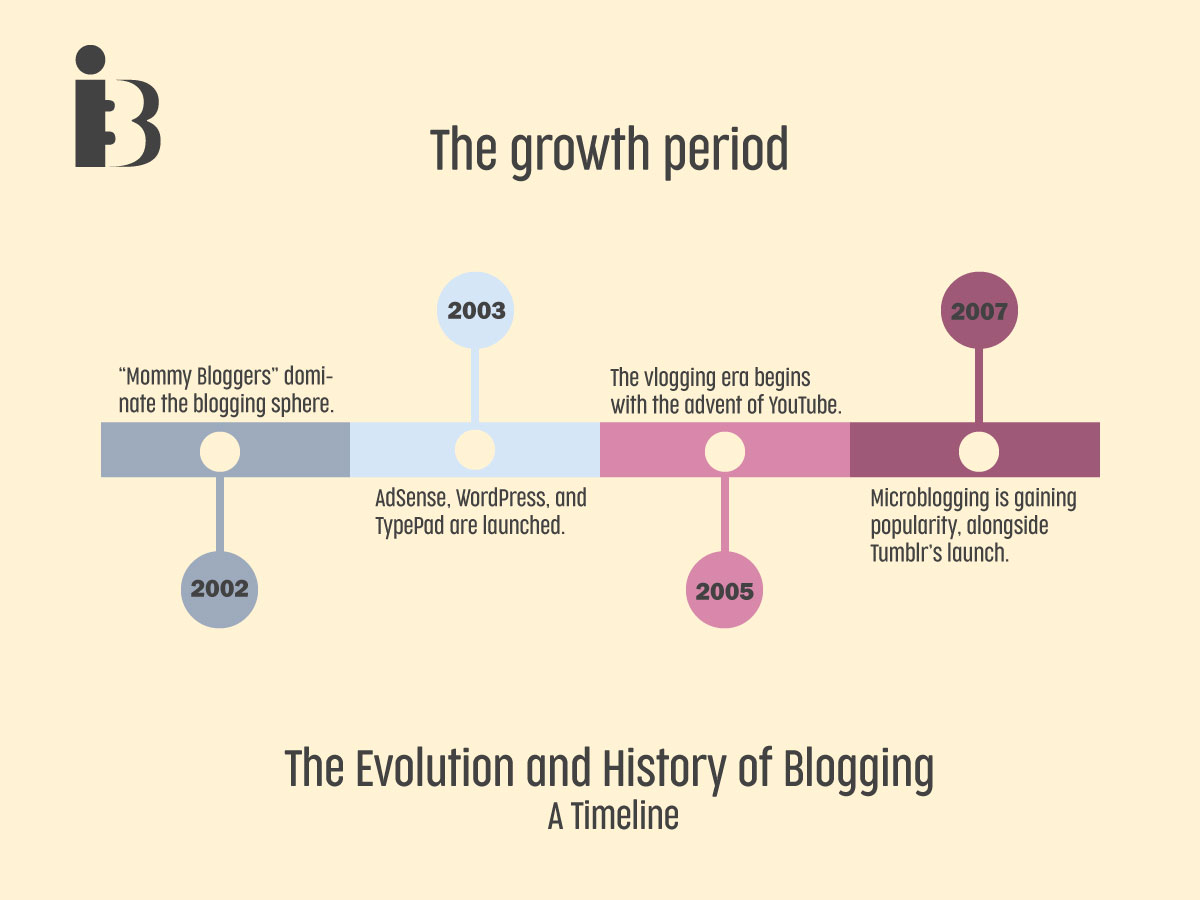
2003: AdSense was launched, along with WordPress and TypePad
2003 was a pivotal year for blogging.
Bloggers started to monetize their blogs. AdSense and other important blogging tools, such as WordPress and TypePad were launched.
2005: The Huffington Post was founded
2005 was marked by the launch of the Huffington Post, now known as HuffPost.
This event contributed to the authority the blogging sphere started to carry.
It wasn’t only a virtual space where mothers posted parenting content anymore, but also a newsroom for sharing political material and commentary on current affairs.
2005: YouTube launched, solidifying video blogs as a legitimate force
This year culminated in YouTube’s launch, which was one of the most innovative platforms at the time.
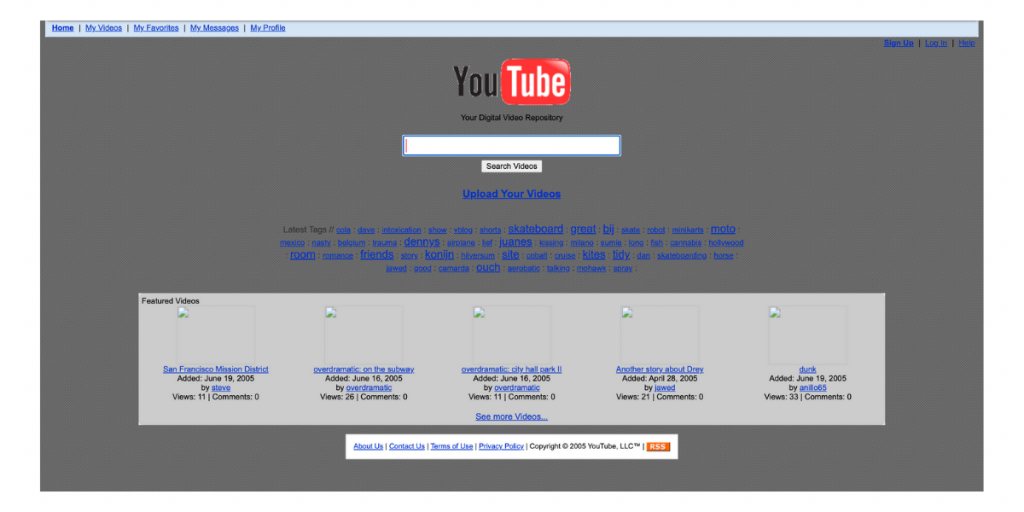
Along with YouTube’s massive success, video blogs increased in popularity and soon became one of the most consumed forms of online content.
2007: Tumblr was launched, continuing the trend of microblogging
Soon after the launch of Twitter in 2006, in 2007, Tumblr was created, taking the microblogging trend further. This development encouraged people to write as succinctly as possible.
Tumblr became a popular online hub with a community approach to blogging. People could share anything from personal blog entries to humorous brief posts that users could reblog, like, or send questions about others’ blog content.
A Brief History of Blog SEO and Design
With YouTube’s launch on the market, vlogging had a dramatic impact on the way people used the internet.
Not only was this type of content gaining popularity, but internet connection became more reliable and stable, so different types of content (rather than just plain text) were beginning to emerge.
While early blogs were almost exclusively made up of plain HTML, blogging soon became more creative and visual, incorporating images and design.
The rise of responsive design
Another critical moment in the history of blogs is related to the mobile revolution.
The early stages of blogs didn’t look great when opened on mobile devices.
Companies experimented with different ways to resolve this issue and created separate sites for mobiles for a short period.
However, they soon realized that it was unsustainable in the long run due to high costs.
The answer was responsive design. In 2015, Google declared that websites that didn’t have a mobile-friendly version would be penalized by the search engine. This improvement in design required the parallel development of new search engine optimization (SEO) techniques within the blogging world.
Blogging in Recent Years (2012-2018)
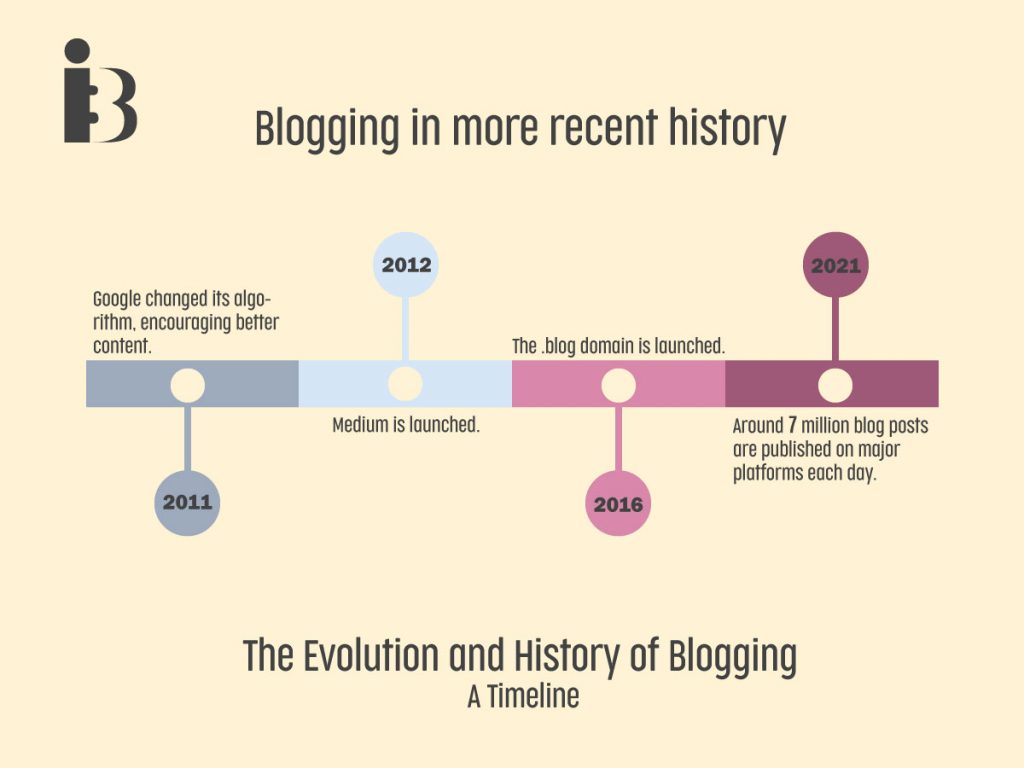
The launch of Medium and the .blog domain were the most significant blogging events during the 2010s.
2012: Medium was founded, as well as LinkedIn’s influencer blogging platform (Pulse)
The modern era of blogging was marked in 2012, when Medium was founded, which remains one of the biggest blogging platforms for amateur writers to this day.
Interestingly enough, the founder of the platform, Evan Williams, is one of the people who started Pyra Labs, the makers of Blogger.
It was also the time when LinkedIn launched its influencer blogging platform called Pulse.
2016: The .blog Domain is launched by WordPress
By 2016, blogging had grown exponentially in popularity. WordPress saw the opportunity and launched the .blog domain extension to its list of blog URLs.
On top of the original domain extensions at the time (.com, .net, .org, etc.), bloggers could now pick a domain name with the .blog extension.
Blogging Today in 2024 and in The Future
This article has outlined the most critical events in blogging history, a phenomenon that’s not going away anytime soon.
Although it has a pretty short history, blogging has evolved a great deal since 1994.
Now, blogs are an integral part of content marketing that businesses and individuals use to increase brand awareness, prove ROI, convert leads, and generate long-term marketing results.
In the beginning, blogs were merely online journals where writers shared their thoughts. However in roughly 30 years, it has become a profitable business.
Increasingly, companies are hiring full-time bloggers to take care of their internal blogs, and more and more writers are turning their attention to freelance blogging as a side hustle that can turn into a reliable source of income.
Another trend that can’t be ignored is the rise of artificial intelligence (AI) and its influence on content creation as a whole. AI tools are incredibly useful for automation and helping bloggers streamline their writing process.
With the future looking promising, it’s exciting to watch the evolution of this dynamic industry.
As history has proven, blogging is set to continue to be successful, so marketers would be wise to keep their finger on the pulse of this industry and its progression.



